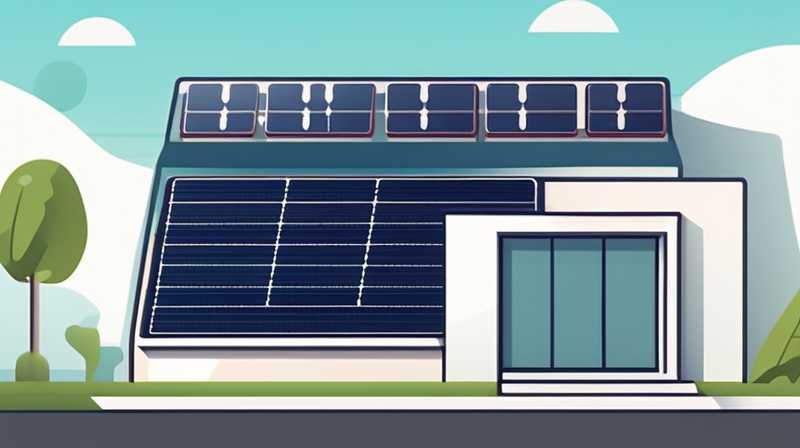
1. SOLAR ENERGY CREATION, Solar panel planting contributes significantly to renewable energy production, **2. ENVIRONMENTAL SUSTAINABILITY, The deployment of solar panels mitigates carbon footprints, **3. ECONOMIC GROWTH, The solar industry generates jobs and stimulates local economies, 4. ENERGY INDEPENDENCE, Harnessing solar power reduces reliance on fossil fuels. Solar panel placement enhances energy security while diversifying energy sources.
1. UNDERSTANDING SOLAR ENERGY CREATION
The genesis of solar energy lies in its ability to convert sunlight into usable electricity. Solar panels, comprised of photovoltaic cells, harness solar radiation through the photovoltaic effect. When sunlight strikes these cells, it excites electrons, creating an electric current. This process not only provides clean energy but also feeds back into the grid, allowing for communal energy usage.
The broader implications of solar energy generation are expansive. The technology ensures that energy produced is sustainable and diminishes reliance on diminishing fossil fuel reserves. Given the increasing urgency surrounding climate change, solar energy emerges as a vital player in addressing global energy challenges. By changing the paradigm of energy production, solar panel deployment fosters environmental resilience through clean energy initiatives.
2. ENVIRONMENTAL SUSTAINABILITY
Environmental sustainability entails maintaining ecological balance while conserving resources for future generations. Solar panel planting plays a pivotal role in this context by reducing greenhouse gas emissions. Traditional energy production methods rely heavily on fossil fuels, leading to significant carbon outputs that exacerbate climate change. Solar energy offers an alternative, providing a clean source of electricity that produces no harmful emissions during operation.
Furthermore, the implementation of solar panels influences land use positively. While the installations do require land, they can coexist with agricultural practices, leading to agrovoltaics, where crops grow underneath solar panels. This dual-use approach optimizes land productivity while ensuring that food supply remains uninterrupted. By harnessing the power of solar energy, society can effectively reduce its carbon footprint, thus promoting a healthier environment for all living organisms.
3. ECONOMIC GROWTH
The burgeoning solar industry represents a significant economic pillar, stimulating local and national economies. The expansion of solar projects creates numerous job opportunities across sectors. Positions in manufacturing, installation, maintenance, and distribution are just a few areas experiencing growth. Educational and training programs also evolve, providing a skilled workforce for this green sector.
Investing in solar technology yields long-term economic benefits. Governments often offer incentives and tax credits, encouraging businesses and homeowners to transition to solar energy. These investments lead to reduced energy costs. Additionally, communities that embrace solar power can achieve energy independence, which insulates them from fluctuating energy prices and foreign energy dependencies. The sustained growth in the solar sector boosts overall economic stability and encourages investments in further renewable technologies.
4. ENERGY INDEPENDENCE
Energy independence is a crucial element of national security and economic strategy. By harnessing solar energy, countries rely less on imported fossil fuels, thereby enhancing their autonomy. This shift is particularly beneficial for nations with scarce natural resources, enabling them to leverage their geographical advantages in solar potential.
Furthermore, energy independence fosters innovation. As nations invest in solar technologies, they may also develop complementary energy solutions, such as energy storage and smart grid systems. These advancements create more resilient energy infrastructure capable of withstanding fluctuations and challenges. Ultimately, solar panel investments promote a diversified energy portfolio — a strategic advantage in a rapidly evolving geopolitical landscape.
FAQs
HOW DO SOLAR PANELS WORK?
Solar panels operate using photovoltaic cells, which convert sunlight into electricity. When photons from sunlight hit these cells, they displace electrons, creating an electric current. This energy can then be harnessed and stored for immediate use or fed back into the electrical grid. The efficiency of solar panels varies based on factors such as the quality of materials used, the angle of sunlight, and environmental conditions. To maximize energy efficiency, it’s crucial to keep panels clean and regularly maintained. Advanced technologies like solar inverters and energy storage systems enhance overall performance, enabling more reliable energy consumption even when sunlight is not available.
WHAT ARE THE ENVIRONMENTAL BENEFITS OF SOLAR ENERGY?
The environmental advantages of solar energy are manifold. Firstly, it produces negligible emissions during operation, in stark contrast to conventional energy sources like coal or gas. This contributes to improved air quality and reduced climate change impacts. Moreover, solar panels mitigate water consumption commonly associated with fossil fuel extraction and electricity production. As the solar industry continues to develop, innovations like solar recycling programs emerge, further minimizing environmental footprints. The adoption of solar technology also promotes habitat preservation, as solar farms can coexist with agricultural land. This symbiotic relationship fosters biodiversity and sustains food production while generating clean energy.
CAN SOLAR ENERGY MEET ALL OF OUR ENERGY NEEDS?
While solar energy has immense potential, it cannot entirely meet all energy demands at this point in time. Factors such as geographic location, seasonal variations, and energy consumption patterns contribute to this limitation. However, as technology advances, solar energy efficiency continues to improve, making it increasingly viable as a primary energy source. In tandem with complementary renewable energy sources like wind and hydroelectric power, solar energy can significantly reduce reliance on fossil fuels. A robust energy infrastructure that includes energy storage and smart grid management will enable more effective harnessing of solar energy, therefore, enhancing its contribution to a sustainable energy future.
The examination of solar panel planting reveals its multifaceted contributions to modern society.
The proactive shifts toward renewable energy sources are critical in tackling climate change, bolstering economic stability, and achieving energy independence.
By investing meaningfully in solar technologies, communities, and countries can foster a resilient future where energy comes from sustainable, clean sources.
The holistic understanding of solar energy’s implementation illustrates its significance, emphasizing the need for continued innovation and commitment to policies that support renewable energy.
As society progresses, transitioning toward solar energy will ensure environmental protection while improving the quality of life, making solar panel planting an essential investment in an eco-conscious future.
Original article by NenPower, If reposted, please credit the source: https://nenpower.com/blog/what-is-the-role-of-solar-panel-planting/


